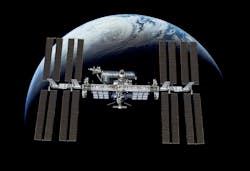On May 21, 2023, scientists at University of California San Diego Sanford Stem Cell Institute launched several new nanobioreactor experiments onto the International Space Station (ISS) via the second Axiom Space Private Astronaut Mission, Axiom Mission 2 (Ax-2). The latest experiments expand their research on human stem cell aging, inflammation and cancer in low Earth orbit.
During Axiom Space’s first Private Astronaut Mission, Axiom Mission 1 (Ax-1), the researchers discovered that in low Earth orbit, cancer stem cells appeared to regenerate more easily and become more resistant to standard therapies. The Ax-2 mission will now determine if two inhibitory drugs can reverse the regeneration in an organoid model of breast cancer. Another line of experiments will track the health of astronauts’ blood stem cells before, during and after spaceflight to evaluate the effects of the space environment on stem cell aging, immune function and cancer stem cell generation.
These projects are part of the NASA-funded Integrated Space Stem Cell Orbital Research (ISSCOR) Center, a collaboration between UC San Diego Sanford Stem Cell Institute, JM Foundation and Axiom Space. The experiments will take place over 10 days in orbit, with subsequent data collection and analysis performed at UC San Diego.
In the latest launch, the scientists have sent tumor organoid models of leukemia, colorectal and breast cancer into low Earth orbit, where the microgravity conditions will accelerate insights into how cancers adopt stem cell properties that make them resistant to standard therapy, including dormancy, regeneration and longevity. The researchers will also test two ADAR1 inhibitors, Fedratinib and Rebecsinib, to see if the drugs can reverse the process of malignant regeneration and potentially prevent cancer progression. These experiments mark the start of a developing program at the Sanford Stem Cell Institute to expand stem cell translational research and drug discovery in space.

